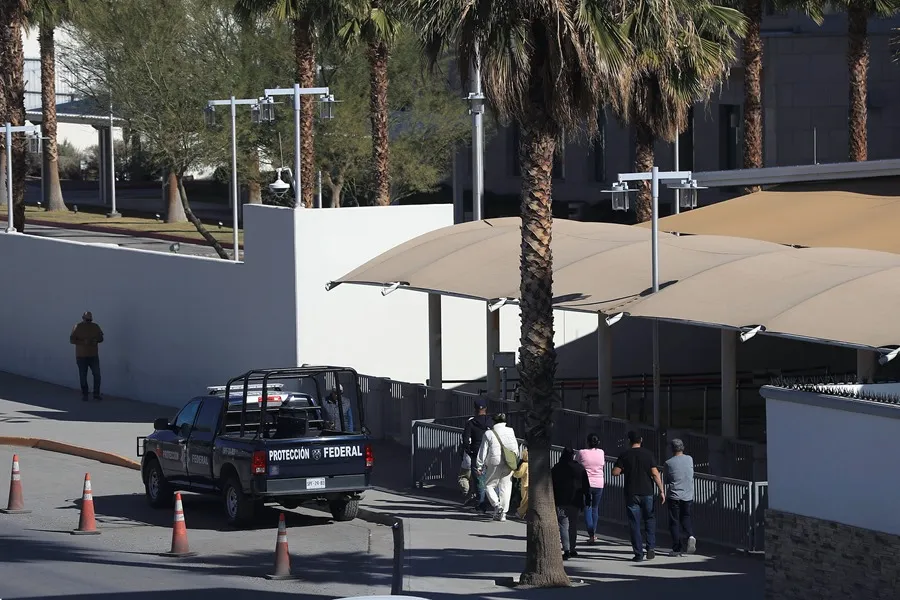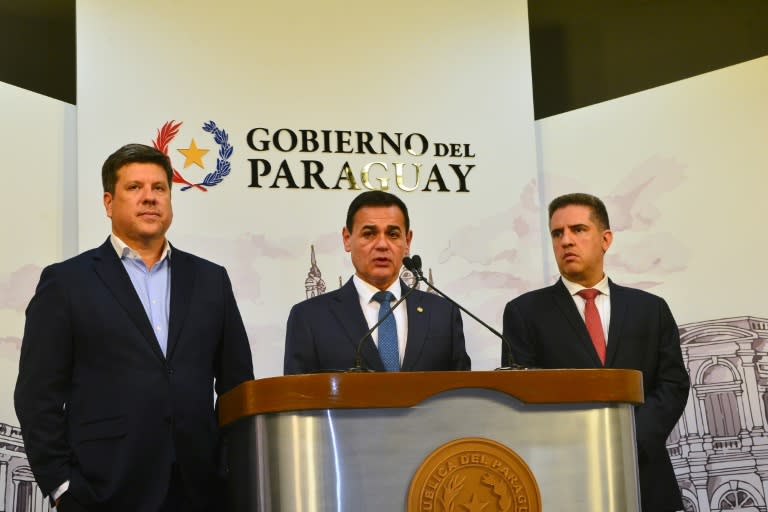International
The Mexican border warns of the impact if Trump restricts temporary work visas

Activists and migrants warn of the migratory impact on the Mexican border and on the inflation of the United States due to the mass deportations that the future government of Donald Trump could carry out and the possible restrictions on temporary non-agricultural visas that President Joe Biden expanded by more than 64,000.
The United States Department of Homeland Security (DHS) announced last week this number of additional visas for temporary non-agricultural workers during fiscal year 2025, permits known as H-2B that will be added to the 66,000 that Congress authorizes annually.
The measure addresses the growing demand for labor in sectors such as hospitality, construction, gardening and food processing, among others, which depend on temporary workers to operate during seasonal peaks.
But US media have reported that the program is in danger during the next presidency of Trump, who has warned of using the Army to carry out mass deportations and has announced appointments of officials who wrote the ‘Project 2025’, which proposes to restrict H-2 visas.
This contrasts with the Biden Government, which “is looking for how to resume what happened in the 1940s,” when the United States implemented the Bracero Program to bring temporary Mexican workers, said Emilio Alberto López, professor at the Autonomous University of Chihuahua, a state bordering the United States.
“The United States, through a macroeconomic crisis, has quite strong inflation, it will also have very strong challenges, and I almost think it goes like in that sense, giving the possibility of these jobs, but basically temporary,” said the internationalist and migration scholar.
Impacted nationalities
Of the 64,000 additional visas, at least 20,000 will be reserved for workers from the three countries of the Northern Triangle of Central America, El Salvador, Guatemala and Honduras, in addition to Haiti, in an effort to offer legal migration alternatives and reduce irregular flows to the United States.
The remainder will be allocated to other regions of the world, with priority given to employers demonstrating an urgent and specific need.
“The Latin race, from the last country in South America to Mexico, all Mexicans, Central Americans, South Americans, are the ones who are raising the economy to the United States,” Venezuelan Milkar Linares, who is stranded in Ciudad Juárez, bordering the US city of El Paso, Texas, told EFE.
Although there is uncertainty about Trump’s measures and the impact on migrants, Linares thinks that in the end the economic reality will prevail.
“Because it’s hard for an American to move a chair to sit down, open the door to go out and, with all due respect and if they feel offended I’m sorry, but what is in sight doesn’t need glasses,” he said.
Reactions and challenges
Business associations in the United States have applauded Biden’s measure for considering it an important step to ensure the continuity of operations in key sectors.
But Professor López Reyes warned that “these visas have already been criticized by some experts, especially those who work on human trafficking issues, because it is very easy for workers to exploit.”
The US government has promised to implement stricter measures to monitor compliance with labor laws in this program, including more frequent inspections and more severe sanctions for employers who engage in illegal practices.
International
Paraguay summons Brazilian ambassador over Itaipú espionage scandal

Paraguay summoned the Brazilian ambassador in Asunción on Tuesday to demand “explanations” and called its own representative in Brasília for consultations following Brazil’s acknowledgment of an espionage operation. The Brazilian government, led by President Luiz Inácio Lula da Silva, attributed the operation to the previous administration.
The surveillance effort aimed to uncover Paraguay’s position in now-suspended negotiations with Brazil regarding the pricing of electricity from the binational Itaipú hydroelectric plant, according to reports in the Brazilian press.
The Brazilian government “categorically denied any involvement in the intelligence operation,” stating in a Foreign Ministry communiqué on Monday that the espionage was carried out under former President Jair Bolsonaro’s administration (2019-2023).
“The operation was authorized by the previous government in June 2022 and was annulled by the interim director of the (state intelligence agency) ABIN on March 27, 2023, as soon as the current administration became aware of it,” Brazil’s government asserted.
Paraguay’s Foreign Minister Rubén Ramírez announced that Brazilian Ambassador José Antonio Marcondes de Carvalho was summoned “to provide detailed explanations” regarding the operation. Additionally, Paraguay recalled its diplomatic representative in Brasília “to report on aspects related to the intelligence activity conducted by Brazil regarding Paraguay’s government affairs.”
International
Elon Musk to step down as government advisor, per Trump insiders

President Donald Trump has informed his inner circle that Elon Musk will be stepping down from his role as a government advisor, according to a report by Politico today.
Citing three individuals close to Trump, Politico states that the president is pleased with Musk’s leadership at the Department of Government Efficiency (DOGE), where he has implemented significant budget cuts. However, both have agreed that it is time for Musk to return to his businesses and support Trump from a different position outside the government.
A senior administration official told Politico that Musk will likely maintain an informal advisory role and continue to be an occasional visitor to the White House. Another source warned that anyone thinking Musk will completely disappear from Trump’s circle is “deluding themselves.”
According to the sources, this transition is expected to coincide with the end of Musk’s tenure as a “special government employee,” a temporary status that exempts him from certain ethics and conflict-of-interest regulations. This 130-day period is set to expire in late May or early June.
International
Milei vows to make Argentina so strong that Falkland Islanders “choose” to join

Argentine President Javier Milei reaffirmed his country’s claim over the Falkland Islands (known as the Islas Malvinas in Argentina) and praised the role of the nation’s armed forces during a ceremony marking the “Veterans and Fallen Soldiers of the Malvinas War Day,” commemorating 43 years since the 1982 conflict with the United Kingdom.
Argentina continues to assert sovereignty over the islands, arguing that Britain unlawfully seized them in 1833.
“If sovereignty over the Malvinas is the issue, we have always made it clear that the most important vote is the one cast with one’s feet. We hope that one day, the Malvinas residents will choose to vote with their feet and join us,” Milei stated.
“That is why we aim to become a global power—so much so that they would prefer to be Argentine, making deterrence or persuasion unnecessary. This is why we have embarked on a path of liberation, working to make Argentina the freest country in the world and once again the nation with the highest GDP per capita on the planet,” he added.
-

 Central America3 days ago
Central America3 days agoU.S. Homeland Security Secretary urges Mexico to strengthen Guatemala border
-

 Central America3 days ago
Central America3 days agoPanama grants Martinelli 72-hour extension to travel to Nicaragua
-

 International1 day ago
International1 day agoParaguay summons Brazilian ambassador over Itaipú espionage scandal
-

 Central America4 days ago
Central America4 days agoPanama police clarifies that Interpol alert for Martinelli is still pending
-

 International3 days ago
International3 days agoTrump urges Putin to reach peace deal
-

 International4 days ago
International4 days agoDeportation flight lands in Venezuela; government denies criminal gang links
-

 Sports1 day ago
Sports1 day agoFilipe Luis debuts as coach in Copa Libertadores with Flamengo
-

 Central America1 day ago
Central America1 day agoGuatemalan police officer killed in mob riots over baby kidnapping
-

 International1 day ago
International1 day agoElon Musk to step down as government advisor, per Trump insiders
-

 Sports1 day ago
Sports1 day agoVenezuela investigates 18 baseball players seeking asylum in Spain
-

 International1 day ago
International1 day agoMilei vows to make Argentina so strong that Falkland Islanders “choose” to join
-

 International1 day ago
International1 day agoICE agent’s arrest of suspect sparks controversy in Boston
-

 International1 day ago
International1 day agoÓscar Arias: Trump’s trade policies are a step backward















